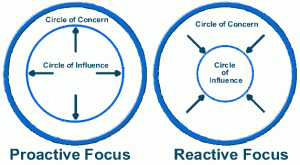Many people have not had an opportunity to read this classic book “7 Habits of highly effective people”. If you do not have time to read complete book, you can get yourself familiarize with the book by reading this post.
In Part 1, we discussed about some important concepts like P/PC balance and foremost fundamental habit (Be Proactive). Part 2 was focused on others Private Victory Habits i.e. Habit 2 and Habit 3.
Part 3, today’s post will describe about Public Victory i.e. Habit 4, 5 and 6. Next and last part will be focused on Sharpen the Saw.

Covey 7 Habits: Public Victory
Similar to first post, let us discuss a couple of concepts before jumping into Private Victory Habits.
The Emotional Bank Account:
An emotional bank account is an account that you have with everyone you know, in particular friends, family and loved ones. Similar to normal bank account, you make deposit and withdrawal in Emotional Bank Account. You make deposits by doing something nice and meaningful to or for that person and you make withdrawals when you hurt them or treat them badly. The balance in your account is the amount of trust that’s been built up in a relationship, the more trust the higher the balance. Just like a monetary bank account, you prefer to have a large balance in this account so that the relationship you have with that person is a high trust relationship.
Actions likes fighting, saying something you regret, or forgetting important dates in your relationship are example of withdrawals. Similar to monetary back account, it is easy to make large/small withdrawal. But if there is no deposit, you account will turn into red soon. You make deposits by one of the following methods:
- Understanding the individual, Key to any other deposit. What is important to other person must be as important to you, as the other person is to you
- Attending to the little Things: e.g. Watching Princess movie with your daughter
- Keeping commitments
- Clarifying expectations
- Showing Personal Integrity
- Apologizing sincerely when you make a withdrawal
I would like to write more about this but it will make this post very long. If someone just follow this principle and work on increasing positive emotional bank balance, you will experience stronger relationships.
Habit 4: Think Win/Win
A human interact with other individual with in following Six paradigms.
- Win/Win: Neither my way nor your way, it’s another way
- Win/Lose: Most of the people are scripted to think this way – I win you lose.
- Lose/Win: Some of the people are programmed this way. Common thoughts in this paradigm are have it your way.
- Lose/Lose: mostly when ego clashes. I do not win so I won’t let you win.
- Win: People with win mentality do not necessarily want the other person to lose, that is irrelevant to them.
- No Deal: self explanatory

Win Win or No Deal
Which option is the best? It depends on situation. In a game, Win is obvious choice. When playing with young children, you might to prefer Lose/Win to give assurance to young kids.
In most of the human interactions, Win/Win is the best option. You can also prefer No Deal. No deal means if we together can’t find a solution that would benefit us both, we agree to disagree.
4 steps process for Win/Win paradigm:
- See the problem from other person’s point of view
- Identify what is the key issue and concerns (not positions)
- Determine what results would constitute a fully acceptable solution
- Identify possible new options to achieve those results
Habit 5: First seek to understand, then to be understood.
It is not uncommon to hear an statements like, “I can’t understand my husband/wife. S/he would not listen to me”. Now read first part of the statement again “I can’t understand my husband/wife”. Is it fault of your husband/wife if you can’t understand him/her? Really? If you can’t understand German language, will you try to learn/understand more German language or will ask people to change German language.
Proactive (Habit 1) people take responsibility and put efforts to understand their husband/wife.
You understand each other’s by communication. There are 4 basic types of communication – Reading, Writing, Speaking and Listening. We spend years learning how to read, write and speak bit no/minimal training in listening that enables us to listen so that we really, deeply, understand another human being from individual’s own frame of reference. This type of listening is called Empathic listening.
Emphatic Listening:
Normally we listen one of the following ways
- Ignoring: Not really listening at all
- Pretending: Acting as we are listening but not really listening. You can find that when someone says ‘Yeah?, ‘Right?
- Selective listening: only part of what is being said. It happens normally when you listen to chatter of a preschooler.
- Attentive listening: Paying attention and focus on words that are being said
- Emphatic listening: Very few of us practice fifth and highest level of listening. It means understanding not only what is being said but also what is the frame of the mind of the person speaking. Emphatic comes from Empathy. Empathy is different than sympathy. Sympathy means you are in agreement with other. Empathy means you understand their frame of mind. You do not have to agree with the other person.

Listening – Important skill in understanding
You can understand others using Emphatic principle. Emphatic listening itself is an incredible deposit in Emotional Bank Account. The more balance you have in your emotional bank account, the more you understand the other person.
Diagnose before you prescribe (To be understood):
Have you ever visited a doctor and have experienced that s/he did not hear you? Did you have faith in the medicine? I remember I had some fever and some stomach pain when I was 15-16 years old. There was a long queue in Dr clinic and I felt that he did not listen to me. I left clinic unheard and un-understood. I did not have faith in the medicine he prescribed to me. So first diagnose (understand) before you prescribe (seek to be understood).
4 Development stage of Emphatic Listening
- Mimic content
- Rephrase the content
- Reflect Feeling
- Rephrase the content and rephrase feeling
As it might be awkward to people so I recommend practicing with couple of closed people. Additionally I recommend you sharing with them so they do not feel awkward when you suddenly repeating what they say to you.
Habit 6: Synergize
Synergy = the whole is greater than sum of the parts. All the habits prepare us to create miracle of synergy.
Synergy means 1 + 1 = 3 or more.

- Synergy
Effective People strongly believe in synergy. They involve people in problems and work out solutions together. If you believe in synergy, next time you become aware of difference in your perception with your friend/colleague or family members, you would say – Good, you see if differently. Help me see what you see.
Valuing differences is what really drives synergy. Do you truly value the mental, emotional, and psychological differences among people? Or do you wish everyone would just agree with you so you could all get along?
Valuing the difference. Is it logical that two people can disagree and the both can be correct? It is not logical. But this is psychological and it is very real.
Let’s look at the photo below for 2 minutes. What do you see?

Covey- Lady Sketch
What did you see in above photo – A young lady or an old lady. If you saw a young lady, consider that I saw an old lady. And if you saw an old lady, consider that I saw a young one. Now who is correct?
Now look at three pictures below. Can you see both ladies (old and young one) in the middle picture?

Once you identify both ladies in lady sketch, it is obvious that new views of knowing the picture have both ladies gives a new paradigm. So, which view was correct? In fact, all views are correct but the third view provides more accurate picture. Believing that there could be a third view is synergy.
Summarizing Synergy habit- When you see only two alternatives – yours and the wrong one – you can look for a synergistic third alternative.
Let me conclude today’s post by summarizing Public Victory habits:
- Habit 4: Think Win/Win
- Habit 5: First seek to understand, then to be understood.
- Habit 6: Synergize
By the way you can purchase the book at Amazon
Question: Select a relationship where you think your Emotional Bank Account balance requires some deposit. Write down the view of other person’s point. In next interaction, just listen to understand other person and compare what you are hearing with what you have written down.
I am also looking forward to hear your experiences in trying to take new habits.












